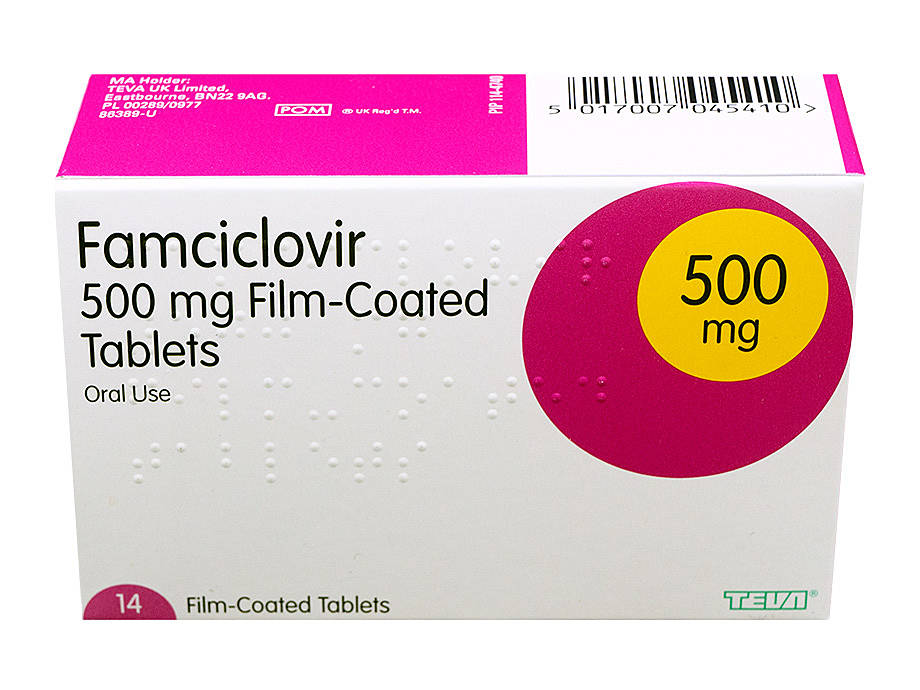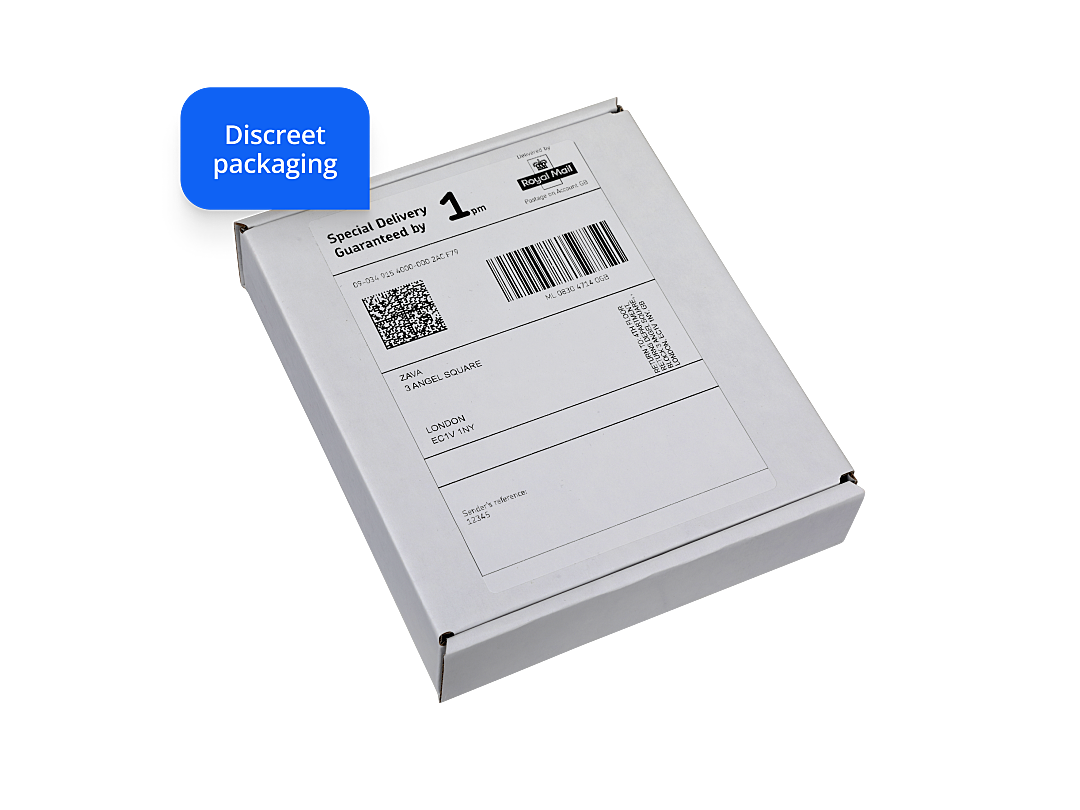



Prices from £95.00
In stock. Simply fill in a brief consultation questionnaire and one of our doctors will review your request today.
-
Famciclovir is a prescription-only medication used to treat infections caused by the herpes virus, including genital herpes, shingles and cold sores. Famciclovir is available in 125, 250, and 500mg tablets.
Prices
4 tablet(s) / 500 mg - £95.00
8 tablet(s) / 500 mg - £165.00
12 tablet(s) / 500 mg - £229.00



About Famciclovir
-
-
Famciclovir is a prescription-only antiviral medication that is used to treat viruses in the herpes family, including:
- herpes zoster which causes shingles (a painful rash on the body)
- herpes simplex which causes infections around the mouth (cold sores) and the anus and genitals (genital herpes)
Famciclovir doesn’t cure herpes infections (there is no cure for herpes), instead it can improve the symptoms and help them clear up quicker. In people who have regular outbreaks of symptoms, it can also reduce how often these outbreaks happen.
-
-
Famciclovir works by stopping the herpes virus from multiplying inside your body. Stopping a virus multiplying prevents it from spreading and makes it easier for your immune system to fight it.
How long does famciclovir take to work?
Studies show that famciclovir can help your herpes sores clear up in as little as 4 days. This is around 2 days faster than without any treatment. It can also make the pain and discomfort of the sores go away around 1 day faster too. Even so, it can take up to 10 days for herpes symptoms to clear up even when taking medication.
-
-
Once you have a prescription for famciclovir, you can get it filled at most pharmacies in the UK. Some online doctor services like ZAVA can help you order famciclovir online.
Can I buy famciclovir online?
Yes, you can buy famciclovir online from licensed online doctors and pharmacy services such as ZAVA. To buy Famciclovir with ZAVA, all you need to do is fill in a brief online questionnaire. Our team of UK-registered doctors will review your answers and prescribe famciclovir if it’s suitable for you. Your medication will then be sent to an address of your choice via our discreet delivery service.
Can you get famciclovir over-the-counter?
No, famciclovir is only available with a prescription. You can’t get prescription herpes treatment over-the-counter. If you’re not sure about getting a prescription, you could use ZAVA to order your treatment online.
-
-
Famciclovir tablets should be swallowed whole with water and can be taken with or without food. Always take your famciclovir tablets as advised by your doctor. For more information, check the information leaflet that comes with your medication.
For genital herpes, famciclovir works best in the first 48 hours after you get symptoms. So you should always take it as soon as you can after you notice the symptoms of a herpes outbreak. If you take it after the first 48 hours, it may take longer to work.
-
-
Famciclovir tablets come in:
- 125mg
- 250mg
- 500mg
- 750mg
- 1000mg
The dose you’re prescribed and how often you’re meant to take it depends on:
- what you’re taking famciclovir for
- whether or not it’s your first herpes outbreak
- your current health status
Because a doctor takes all these into account when they prescribe famciclovir, it’s important to stick to the dose they prescribe.
125mg
This dose can be taken 2 times a day for 5 days for people who are having a repeat outbreak of genital herpes and who don’t have any extra health considerations.
250mg
This dose is taken twice a day for 6-12 months in a row to help avoid genital herpes outbreaks. This is known as a herpes suppression treatment and is usually prescribed if you get recurrent outbreaks. It can also be taken 3 times a day for 5 days when someone is having their first ever outbreak.
500mg
This dose has the most use-cases for people who have a weak immune system for treating and preventing outbreaks of herpes, and for treating cold sores and shingles. The number of tablets taken daily and the length of treatment varies based on what’s being treated.
750mg
This is only used 1 to 2 times a day for 7 days as an alternative dosing schedule for treating shingles.
1000mg or 1g
This is taken twice a day for just one day as an alternative option for treating repeat herpes outbreaks.
-
-
Headaches are the most common side effect, affecting over 10% of people who take famciclovir.
Common famciclovir side effects that up to 10% of people get, include:
- nausea (feeling sick)
- diarrhoea
- stomach pain
- dizziness
These are usually mild and not serious, but if they continue for a long time or get worse, speak to a doctor.
Less common famciclovir side effects that up to 1% of people get, include:
- mental changes or changes in mood, like confusion, agitation, dizziness or drowsiness
- somnolence (feeling very tired and ready to fall asleep)
- angioedema (swelling on your face and neck)
Rare famciclovir side effects that only affect up to 1 in every 1000 people, include:
- thrombocytopaenia (a purplish rash or blotches on the skin)
- hallucinations (seeing things that aren’t there)
- palpitations (fast or irregular heart rate)
- cholestatic jaundice (yellowing or itching of the skin)
- anaphylactic shock, which is a severe allergic reaction that presents as difficulty breathing, swelling of the face and neck, skin rash, vomiting, fainting, dizziness and fast heart rate (this is an emergency and you need to call an ambulance)
- seizures (fits)
- serious skin reactions
If you have any of these symptoms, get medical help from your doctor, pharmacist, or healthcare provider right away.
-
-
Famciclovir may not be safe for some people. Your doctor will ask you some questions before prescribing famciclovir tablets. You should tell your doctor if you:
- are allergic to famciclovir, penciclovir or any other antiviral medication
- have a history of kidney problems
- have liver problems
- are under 18
- are pregnant or breastfeeding
-
-
Famciclovir does not normally react with other medications, but be sure to tell your doctor about any other treatments you are taking, including herbal remedies and supplements. It’s a good idea not to drink alcohol or use marijuana (weed) while taking famciclovir, since this can make some of the side effects worse.
-
-
As well as famciclovir, there are other antiviral medications available that work in a similar way, including:
- aciclovir (Zovirax)
- valacyclovir (Valtrex)
Both of these are very similar to famciclovir and work in similar ways, but they can cause slightly different side effects. In cases of severe herpes outbreaks, or for immunocompromised patients, aciclovir might be given via IV (into your vein). Your doctor can help you decide which treatment is best for you.
Is famciclovir better than valaciclovir?
A review of famciclovir vs valaciclovir shows that herpes might come back slightly faster with famciclovir.
Even so, all 3 antiviral medications (aciclovir, valaciclovir and famciclovir) are highly effective in treating herpes symptoms. Your doctor will decide which one is right for you based on your symptoms, immune system, lifestyle, and overall health.
-
Frequently asked questions
What is the brand name for famciclovir?
Famvir is the branded name of the antiviral medication with the active substance famciclovir. It is also available under the names “Famvir 250” or “Famvir 500”, which are produced under the brand name ‘Famvir UK’ by Novartis Pharmaceuticals UK Ltd. Famciclovir is the generic, unbranded version of Famvir. Both treatments work in the same way.
How long does famciclovir stay in your system?
Famciclovir has a short half life (the time it takes for half of the medication to leave your body) of around 2 and a half hours. It can take 3-7 days for famciclovir to completely leave your system.
Why was famciclovir discontinued?
The branded version of famciclovir, Famvir, was discontinued in the US in August 2021 and it’s also discontinued in the UK too. The Food and Drug Administration (FDA) states that this was not due to manufacturing, product quality, safety, or efficacy concerns. However, generic versions of famciclovir are still approved and available.
How long has famciclovir been on the market?
Famciclovir was approved for use in the treatment of herpes zoster (shingles) in 1994 and later for the treatment of herpes simplex (cold sores and genital herpes).
Can famciclovir be taken with ibuprofen?
Yes, it’s safe to take ibuprofen while taking famciclovir. As with all medications, make sure you read the patient information leaflet and take the medication correctly.
How much does famciclovir cost?
You can see the cost of ordering famciclovir through ZAVA’s online doctor service at the top of this page. Because it’s a generic, non-branded medication, famciclovir is generally cheaper than branded Famvir.

Dr Babak Ashrafi Clinical Lead for Service Expansion
Accreditations: BSc, MBBS, MRCGP (2008)
Babak studied medicine at King’s College London and graduated in 2003, having also gained a bachelor’s degree in Physiology during his time there. He completed his general practice (GP) training in East London, where he worked for a number of years as a partner at a large inner-city GP practice. He completed the Royal College of GPs membership exam in 2007.
Meet our doctorsLast reviewed: 08 May 2024
-
Comparative efficacy of famciclovir and valacyclovir for suppression of recurrent genital herpes and viral shedding, Pubmed (accessed 28 April 2024)
-
Cold sores, NHS (accessed 28 April 2024)
-
Famciclovir for the Treatment of Recurrent Genital and Labial Herpes Lesions, Skin Therapy (accessed 28 April 2024)
-
Famciclovir 250 mg film-coated tablets, EMC (accessed 28 April 2024)
-
Genital herpes, NHS (accessed 28 April 2024)








